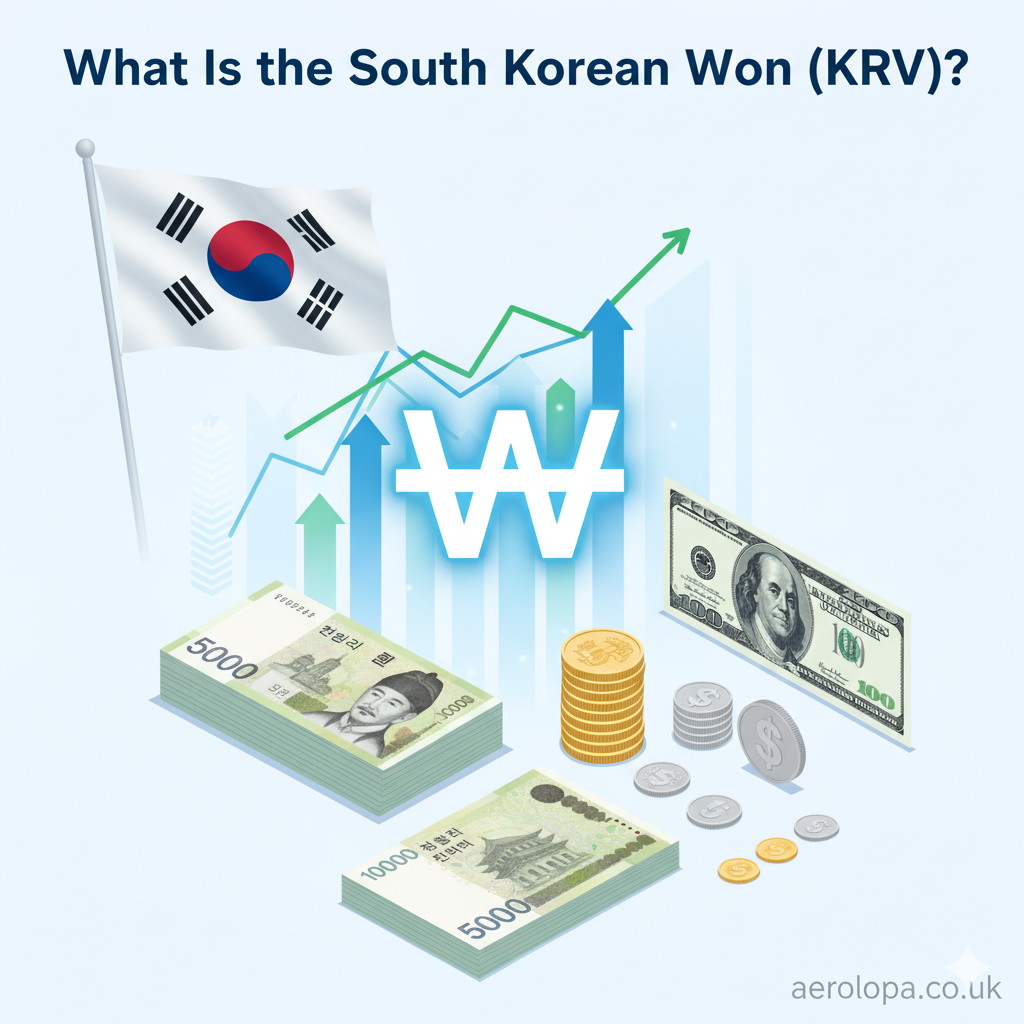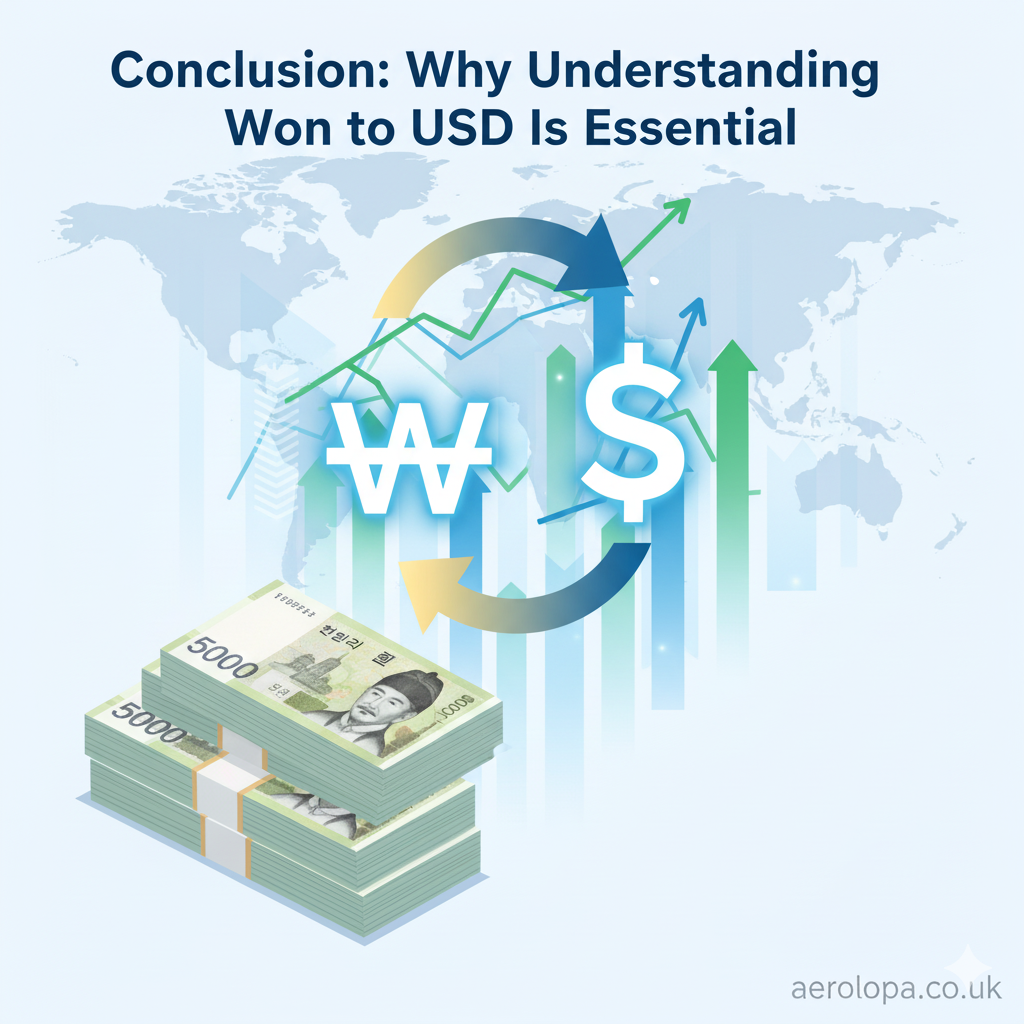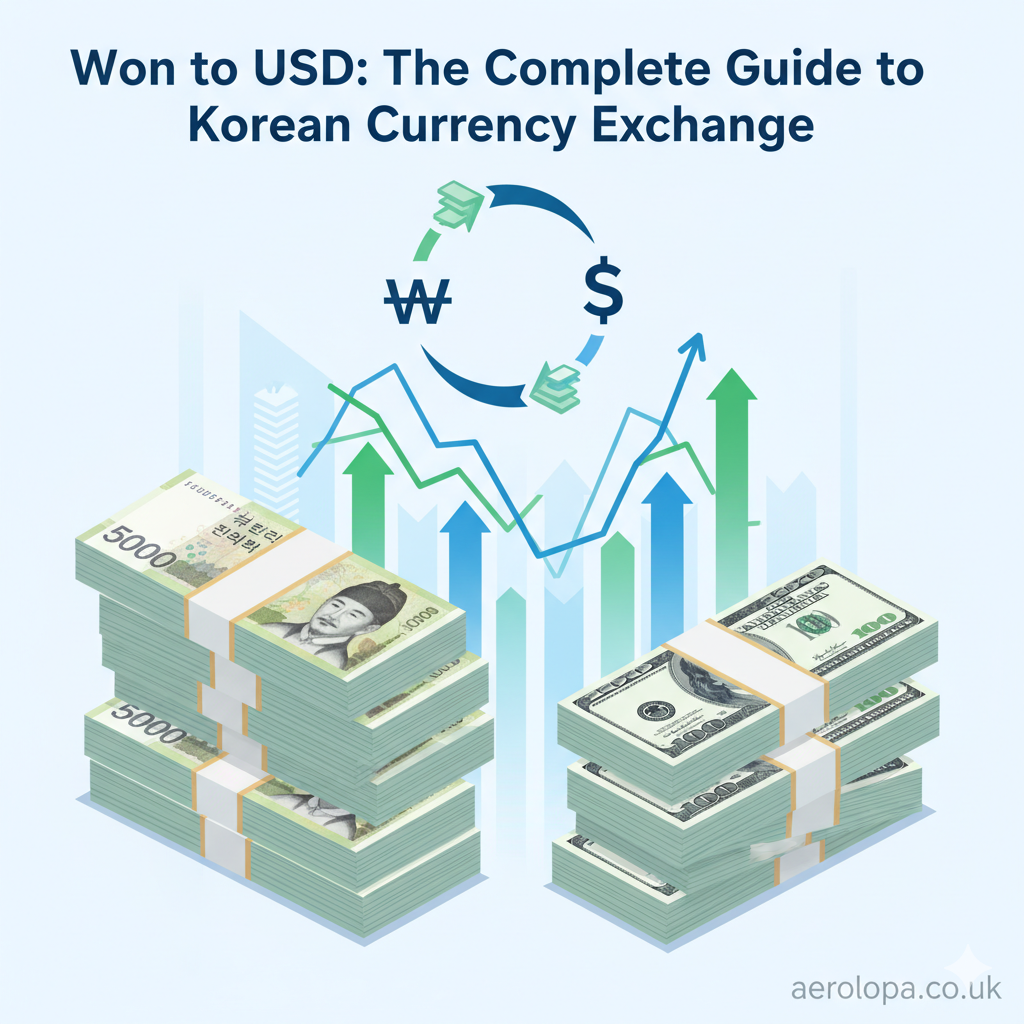Being able to exchange won to USD is important for travelers, investors, businesses, and anyone involved with cross-border transactions. Given South Korea’s large economic size, the South Korean won (KRW) influences global markets. In this article, you’ll find a comprehensive guide to exchanging between Korean won and USD that includes live rates, historical trends, big exchanges (such as 45.6 billion won to USD), and tips to help you get the most for your money.
What Is the South Korean Won (KRW)?

The South Korean won is the official currency of South Korea. It is issued by the Bank of Korea and used both in Korea, as well as internationally for financial markets.
- Currency Code: KRW
- Symbol: ₩
- Denominations: Notes can be ₩1,000, ₩5,000, ₩10,000, and ₩50,000. Coins come in smaller denominations.
Why Is “Won to USD” Conversion Important?
The won to USD conversion rate is crucial because:
- Travelers: Tourists visiting South Korea or the U.S. need accurate exchange rates for budgeting.
- Businesses: Korean exporters and American importers calculate profits in USD.
- Investors: Traders analyze won to USD fluctuations to make informed decisions.
- Students/Workers Abroad: Korean students in the U.S. or expats sending money home depend on this conversion.
Live Conversion Examples: Popular Searches
Here are some frequently searched conversions that help illustrate the scale of KRW to USD exchanges:
- 1 billion won to USD ≈ $730,000 (approximate, varies with exchange rate)
- 45.6 billion won to USD ≈ $33.3 million
- 45 billion won to USD ≈ $32.8 million
- 456 billion won to USD ≈ $333 million
- 300 million won to USD ≈ $219,000
- 78 million won to USD ≈ $57,000
- 70 million won to USD ≈ $51,000
- 24 million won to USD ≈ $17,500
- 65,000 won to USD ≈ $48
- 10,000 won to USD ≈ $7.30
Note: Rates fluctuate daily. These are examples based on average rates around ₩1,370 = $1.
Factors That Affect the Won to USD Exchange Rate
The Korean won to USD rate is not fixed. It fluctuates based on global and domestic factors:
- Economic Indicators: Inflation, GDP growth, and unemployment in Korea and the U.S.
- Trade Balance: South Korea’s heavy export economy impacts demand for the won.
- Geopolitical Issues: Tensions in the Korean peninsula or U.S. interest rate changes affect currency value.
- Central Bank Policies: The Bank of Korea and the U.S. Federal Reserve often intervene.
- Investor Sentiment: Global investors buying or selling won-denominated assets influence its strength.
How to Convert Won to USD Easily
1. Online Currency Converters
Websites like XE, OANDA, and Google Finance give instant won to USD conversions.
2. Bank & Forex Services
Banks offer reliable conversion but may charge higher fees compared to forex agencies.
3. Credit/Debit Cards
Using international cards provides real-time conversions, but often with hidden charges.
4. Airport & Local Exchanges
Convenient but usually come with less favorable rates.
5. Money Transfer Apps
Services like Wise (TransferWise), PayPal, and Western Union make it easy to send KRW to USD.
Historical Trends of Won to USD
- 1997 Asian Financial Crisis: The won lost significant value against the USD.
- 2008 Global Recession: Another sharp decline in the won occurred.
- 2020–2023: COVID-19 volatility caused fluctuations, but the won remained relatively stable.
- Present: As of 2025, the won trades in the range of 1,300–1,400 KRW per USD.
Large-Scale Conversions: Billion Won to USD
For businesses and investors, conversions like 1 billion won to USD or 45 billion won to USD matter greatly. To put it into perspective:
- A Korean entertainment company earning 1 billion won from a project translates to roughly $730,000 in U.S. terms.
- A real estate deal worth 456 billion won converts to over $333 million USD, enough for multiple skyscraper projects.
Travel Tips for Currency Exchange
- Exchange a small amount at the airport, but use banks or city forex centers for better rates.
- For flexibility, keep a variety of cash and credit cards on hand.
- Check live rates daily as they can change quickly.
- Avoid exchanging too much at once unless rates are favorable.
Why the Won to USD Exchange Matters in Global Markets
The won to USD is not just about travelers—it affects industries worldwide:
- K-pop & Entertainment: International concerts and streaming revenues are converted from USD to KRW.
- Technology Exports: Samsung, LG, and Hyundai earn billions in USD, later exchanged into won.
- Education: Korean students in the U.S. must pay tuition in USD, making conversion essential.
- Military & Diplomacy: U.S. military bases in Korea deal in both currencies.
Frequently Asked Questions (FAQs)
1. What is the current exchange rate for won to USD?
It usually fluctuates around ₩1,300–₩1,400 per $1, but check live updates.
2. How much is 10,000 won to USD?
Approximately $7.30 depending on the market rate.
3. Is it better to exchange won in Korea or the U.S.?
Typically, better rates are available in South Korea at banks or forex centers.
4. Why is the Korean won weaker than the U.S. dollar?
Because the U.S. dollar is a global reserve currency with higher demand.
5. Can I use USD in South Korea directly?
Not widely. It’s better to exchange into KRW for local use.
6. How much is 45 billion won to USD?
About $32.8 million at average exchange rates.
7. Are exchange rates the same across all banks?
No, each bank and service provider may add their own fees.
8. Is the Korean won stable compared to other Asian currencies?
Yes, it is relatively stable due to Korea’s strong export economy.
9. How much is 65,000 won to USD?
Around $48.
10. Can businesses hedge against won to USD fluctuations?
Yes, using forward contracts, currency swaps, and other forex tools.
Conclusion: Why Understanding Won to USD Is Essential

From 10,000 won to USD for a tourist to 456 billion won to USD for a multinational company, exchange rates shape everyday life and global finance. Knowing how to calculate and optimize won to USD conversions ensures better financial decisions whether you’re traveling, investing, or running an international business.
Make it a regular practice to track the most current exchange rates, compare exchange conversions, and track market shifts in the global economy. Converting the won to USD is not just another way to represent an amount of money but reflects a trade, cultural view, and financial opportunity.




